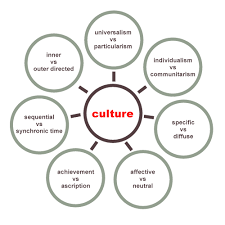Navigating the Complexities of Cultural Differences Theory

The Cultural Differences Theory: Understanding Diverse Perspectives
In a world that is increasingly interconnected, the study of cultural differences has become more important than ever. The Cultural Differences Theory explores the various ways in which societies and individuals differ in terms of beliefs, values, norms, and behaviours.
At the heart of this theory is the recognition that culture plays a significant role in shaping how people perceive the world around them. From communication styles to social customs, every aspect of a culture influences the way its members interact with one another and with outsiders.
One key aspect of the Cultural Differences Theory is the concept of cultural relativism, which suggests that each culture should be understood on its own terms without imposing external judgments. This approach encourages individuals to appreciate and respect the diversity of human experiences without assuming that one culture is superior to another.
By studying cultural differences, researchers can gain valuable insights into how societies function and evolve over time. This knowledge can be particularly useful in fields such as international relations, business management, and cross-cultural communication.
Ultimately, the Cultural Differences Theory reminds us of the richness and complexity of human cultures. Embracing diversity and seeking to understand different perspectives can lead to greater empathy, cooperation, and harmony in an increasingly globalised world.
7 Essential Tips for Understanding and Navigating Cultural Differences
- Recognize that cultural differences theory suggests that people from different cultures may have varying values, beliefs, and behaviours.
- Be open-minded and curious to learn about other cultures without making assumptions or judgments.
- Develop cross-cultural communication skills to effectively interact with individuals from diverse cultural backgrounds.
- Understand the concept of cultural relativism, which emphasises the importance of viewing cultural practices within their own cultural context.
- Avoid stereotyping or generalising about a particular culture, as each individual is unique regardless of their cultural background.
- Embrace diversity and appreciate the richness it brings to society by fostering inclusivity and respect for all cultures.
- Continuously educate yourself on different cultures through books, documentaries, travel, or engaging with people from various backgrounds.
Recognize that cultural differences theory suggests that people from different cultures may have varying values, beliefs, and behaviours.
The concept of cultural differences theory underscores the importance of acknowledging that individuals from diverse cultures may hold distinct values, beliefs, and behaviours. By recognising these variations, we can cultivate a deeper understanding and appreciation for the multifaceted nature of human societies. Embracing the idea that cultural perspectives shape how individuals perceive the world around them can lead to greater empathy, respect, and effective cross-cultural communication.
Be open-minded and curious to learn about other cultures without making assumptions or judgments.
It is crucial to approach the study of cultural differences with an open mind and a curious spirit, refraining from making assumptions or passing judgments. By embracing a mindset of openness and genuine curiosity, individuals can truly appreciate the richness and diversity of other cultures. This approach allows for meaningful cross-cultural interactions, fostering mutual understanding and respect while avoiding the pitfalls of ethnocentrism. Embracing this tip on cultural differences theory not only promotes personal growth but also contributes to building bridges between people from different backgrounds.
Develop cross-cultural communication skills to effectively interact with individuals from diverse cultural backgrounds.
To navigate the complexities of cultural differences theory, it is essential to cultivate strong cross-cultural communication skills. By honing these abilities, individuals can engage effectively with people from diverse cultural backgrounds, fostering mutual understanding and respect. Developing sensitivity to cultural nuances, adapting communication styles accordingly, and demonstrating openness to learning about others’ perspectives are all key components of successful cross-cultural interactions. Embracing these skills not only facilitates smoother communication but also promotes meaningful connections across cultural boundaries.
Understand the concept of cultural relativism, which emphasises the importance of viewing cultural practices within their own cultural context.
Understanding the concept of cultural relativism is essential when exploring cultural differences theory. This principle underscores the significance of interpreting cultural practices within their specific cultural context rather than applying external judgments. By embracing cultural relativism, individuals can appreciate the diversity of beliefs and behaviours across different societies without imposing their own values or standards. This approach fosters a deeper understanding of how cultures shape perspectives and behaviours, promoting respect and empathy towards varying ways of life.
Avoid stereotyping or generalising about a particular culture, as each individual is unique regardless of their cultural background.
It is crucial to avoid stereotyping or making generalisations about a specific culture, as every individual is unique, irrespective of their cultural heritage. Recognising the diversity of experiences and perspectives within a culture helps foster a more inclusive and respectful environment. By acknowledging the individuality of each person, we can move beyond preconceived notions and engage with others in a meaningful and authentic way that honours their distinct identity.
Embrace diversity and appreciate the richness it brings to society by fostering inclusivity and respect for all cultures.
Embracing diversity and appreciating the richness it brings to society is essential for fostering inclusivity and respect for all cultures. By recognising and celebrating the differences that exist among various cultural groups, we can create a more harmonious and understanding community. Valuing diverse perspectives not only enriches our collective experiences but also promotes tolerance, empathy, and unity. Through embracing diversity, we can build a more inclusive society where every individual feels valued and respected for their unique background and heritage.
Continuously educate yourself on different cultures through books, documentaries, travel, or engaging with people from various backgrounds.
To gain a deeper understanding of cultural differences theory, it is essential to engage in continuous education by exploring diverse cultures through various means. Reading books, watching documentaries, travelling to different countries, and interacting with individuals from various backgrounds are all valuable ways to broaden one’s perspective and enhance cultural awareness. By immersing oneself in different cultural experiences, one can develop a more nuanced appreciation for the complexities of human societies and foster meaningful connections with people from around the world.

